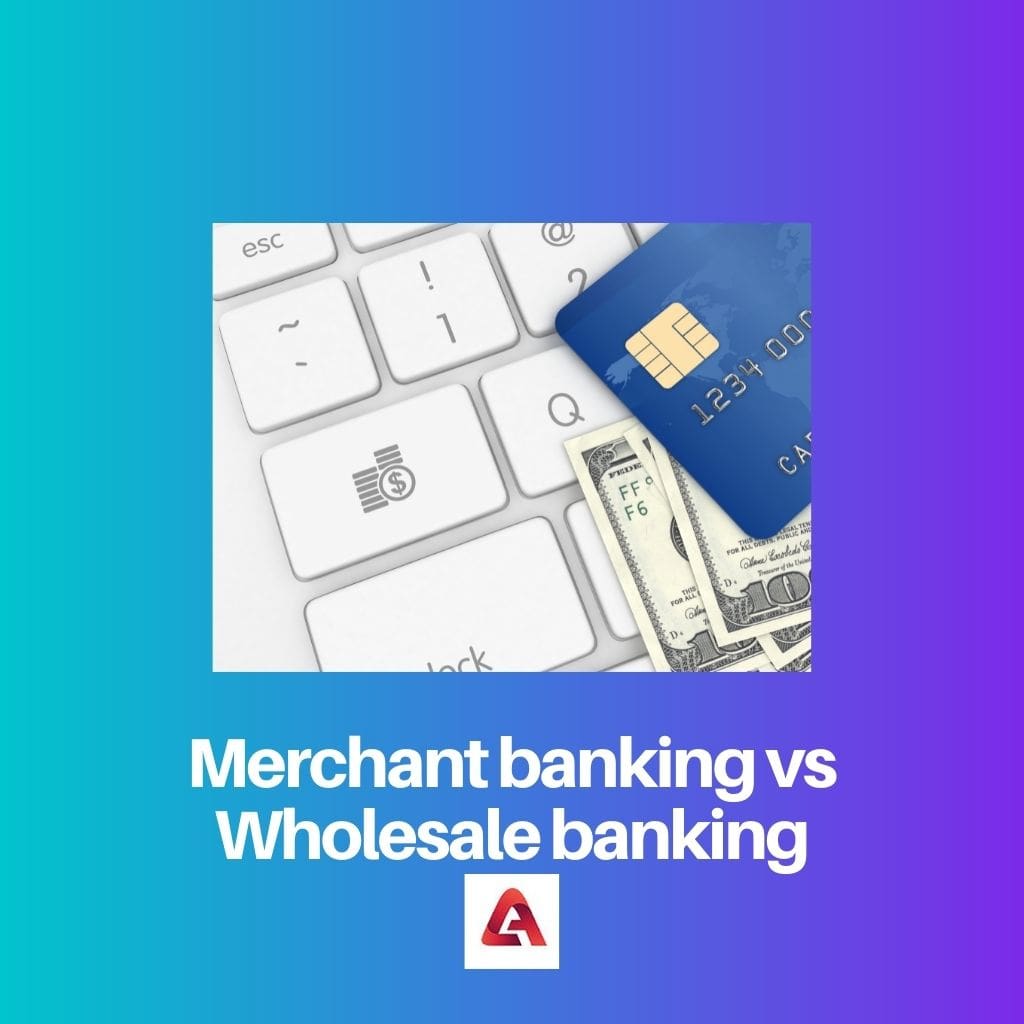Merchant banking primarily deals with providing financial services such as underwriting, advisory, and investment management to corporations and high-net-worth individuals. On the other hand, wholesale banking focuses on serving large institutions, offering a range of financial products like loans, treasury services, and trade finance.
Key Takeaways
- Merchant banking provides specialized financial services to businesses, such as corporate advisory, capital raising, and underwriting.
- Wholesale banking provides financial services to large institutions, governments, and corporations, including lending, cash management, and treasury services.
- Although both types of banking serve large clients, merchant banking emphasizes advisory and capital-raising services, while wholesale banking provides a broader range of financial products and services.
Merchant Banking vs Wholesale Banking
The difference between a Merchant bank and a wholesale bank is that a merchant bank manages international services and provides services to many business people. In contrast, a wholesale bank assists institutional customers and big companies.

Comparison Table
| Feature | Merchant Banking | Wholesale Banking |
|---|---|---|
| Clientele | High-net-worth individuals, large corporations | Large corporations, government agencies, other financial institutions |
| Services Offered | Mergers & Acquisitions (M&A) advisory, underwriting, venture capital, restructuring, wealth management | Loans (working capital, trade finance), cash management, foreign exchange, interest rate derivatives, trade finance |
| Relationship Focus | Long-term, strategic | Transactional, focused on specific needs |
| Minimum Account Size | High (millions or tens of millions) | Large (but can vary depending on service) |
| Complexity of Services | High (custom-tailored solutions) | Can be complex, but also standardized products |
| Risk Tolerance | High | High |
What is Merchant Banking?
Functions of Merchant Banking
1. Corporate Finance Advisory
Merchant banks provide strategic financial advice to corporations regarding capital structuring, mergers and acquisitions, and other financial decisions. They assist in optimizing capital utilization and enhancing overall financial performance.
2. Underwriting of Securities
Merchant banks often act as underwriters for securities issuances. They assume the risk of buying securities from the issuing company and reselling them to investors. This underwriting process helps companies raise capital through public offerings.
3. Project Counseling and Appraisal
Merchant banks evaluate and counsel businesses on their projects. They conduct thorough appraisals to assess the feasibility and viability of proposed ventures, helping clients make informed investment decisions.
4. Loan Syndication
Merchant banks facilitate large-scale loans by forming syndicates. They bring together multiple financial institutions to collectively fund a loan, spreading the risk among several lenders and ensuring access to substantial amounts of capital.
Services Offered by Merchant Banks
1. Portfolio Management
Merchant banks offer portfolio management services to high-net-worth individuals and institutions. They create diversified investment portfolios tailored to the client’s financial goals and risk tolerance.
2. Credit Syndication
In addition to loan syndication, merchant banks are involved in credit syndication. They assist clients in securing credit facilities by collaborating with multiple lenders, negotiating terms, and structuring financing arrangements.
3. Risk Management
Merchant banks help clients manage financial risks through derivatives, hedging strategies, and other risk mitigation techniques. This service is crucial in volatile market conditions to safeguard against adverse financial movements.
4. Financial Restructuring
When a company faces financial challenges, merchant banks play a role in financial restructuring. They assist in renegotiating debt, optimizing capital structure, and implementing strategies to improve financial stability.
Regulatory Framework
1. Regulatory Compliance
Merchant banks operate within a regulatory framework set by financial authorities. Compliance with regulations ensures transparency, ethical conduct, and protection of the interests of clients and stakeholders.
2. Licensing Requirements
To engage in merchant banking activities, institutions must obtain appropriate licenses from regulatory authorities. These licenses demonstrate adherence to regulatory standards and competency in offering specialized financial services.

What is Wholesale Banking?
Services Offered
Corporate Lending
Wholesale banks offer corporate lending services to assist large businesses in funding their operations, expansion, and capital expenditures. These loans are often substantial in size and can be customized based on the specific financial requirements of the corporate client.
Treasury and Cash Management
Wholesale banks provide treasury and cash management solutions to help clients efficiently manage their liquidity, optimize cash flows, and enhance overall financial performance. These services may include cash concentration, disbursement services, and electronic fund transfers.
Trade Finance
Trade finance is a crucial aspect of wholesale banking, involving services like letters of credit, export and import financing, and trade facilitation. Wholesale banks play a pivotal role in supporting international trade transactions by mitigating risks and ensuring smooth cross-border trade.
Capital Markets and Investment Banking
Wholesale banks engage in capital markets activities, such as underwriting securities, facilitating mergers and acquisitions, and providing advisory services. Investment banking within wholesale banking focuses on assisting clients in raising capital through equity and debt instruments.
Risk Management
Wholesale banks offer comprehensive risk management services, including hedging solutions for interest rate, currency, and commodity risks. These services help clients mitigate financial uncertainties and protect their businesses from adverse market movements.
Clients
Large Corporations
Wholesale banks primarily serve large corporations with complex financial needs. These clients may require substantial funding for expansion projects, working capital management, and other strategic initiatives.
Financial Institutions
Wholesale banking caters to the financial needs of other banks, credit unions, and non-banking financial institutions. This includes providing interbank lending, facilitating financial transactions, and offering various financial products.
Government Entities
Government bodies often utilize wholesale banking services for managing public finances, issuing bonds, and implementing financial strategies to support economic development initiatives.
Key Characteristics
Relationship-driven
Wholesale banking relies heavily on establishing and maintaining strong relationships with clients. Relationship managers work closely with institutional clients to understand their unique financial needs and provide personalized solutions.
Specialized Expertise
Given the complexity of financial transactions in wholesale banking, institutions in this sector possess specialized expertise in areas such as risk management, capital markets, and international finance.
Technology Integration
Wholesale banks leverage advanced technologies to enhance their operational efficiency, provide real-time financial information, and streamline transaction processes for their clients.

Main Differences Between Merchant Banking and Wholesale Banking
- Nature of Services:
- Merchant Banking: Primarily involved in providing financial services to corporate clients, such as underwriting, advisory, and project financing.
- Wholesale Banking: Focuses on catering to the financial needs of large institutional clients, including other banks, corporations, and government entities.
- Client Base:
- Merchant Banking: Mainly serves corporate clients, including assistance in capital raising, mergers and acquisitions, and investment advisory.
- Wholesale Banking: Targets a broader range of institutional clients, which may include banks, large corporations, and government bodies.
- Functions:
- Merchant Banking: Engages in activities like issue management, portfolio management, and corporate advisory services.
- Wholesale Banking: Provides a wide array of services, such as treasury management, trade finance, and cash management, to meet the financial needs of institutional clients.
- Risk Exposure:
- Merchant Banking: Involves higher exposure to market-related risks due to involvement in underwriting and investment banking activities.
- Wholesale Banking: Faces risks associated with large-scale financial transactions, credit risk management, and market fluctuations.
- Regulation:
- Merchant Banking: Governed by regulatory bodies overseeing capital markets and securities, as their activities often involve the stock market.
- Wholesale Banking: Subject to banking regulations and oversight, ensuring compliance with prudential norms and risk management standards.
- Financial Products:
- Merchant Banking: Deals with a range of financial instruments, including stocks, bonds, and other investment products tailored for corporate clients.
- Wholesale Banking: Offers a diverse set of financial products and services, such as loans, trade finance, and treasury products, to meet the needs of institutional clients.
- Primary Focus:
- Merchant Banking: Emphasizes investment banking functions, with a focus on capital market activities and financial advisory services.
- Wholesale Banking: Concentrates on providing banking services on a larger scale, addressing the financial requirements of institutions rather than individual clients.

- https://content.kopykitab.com/ebooks/2018/04/17755/sample/sample_17755.pdf
- https://www.persee.fr/doc/reco_0035-2764_1992_num_43_2_409350

The comparison table is very useful in understanding the differences. It makes this information easier to comprehend.
The reference links are a great addition. Those willing to research further will now have the opportunity to do so.
Absolutely, it’s always good to have additional resources available.
Agreed, having the references is very helpful and encourages further reading.
This bank functionality is truly impressive
The ways that these banks operate are interesting. I think this info is important for people with some knowledge in the financial area.
I agree, the different banking concepts are fascinating
I think the concept of Merchant Banking and Wholesale Banking is well explained in this article. This is a great piece for those looking for more information.
I think the information is very informative. The contrast between merchant banking and wholesale banking is clearly outlined.
I think the main differences between merchant banking and wholesale banking are well detailed. It’s great to have clear distinctions.
I believe that the risk comparison really stands out here. This will help people understand a thing or two about banking risk.
Wholesale banking seems to provide more security for depositors, it’s definitely something to consider.
I think the article is very comprehensive